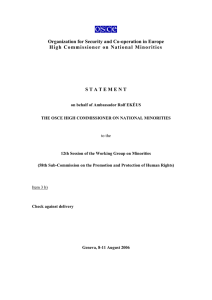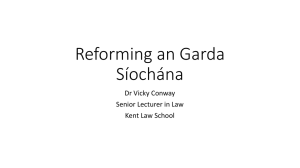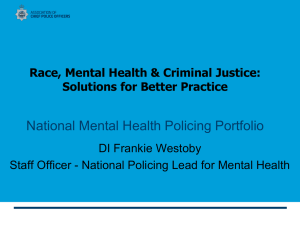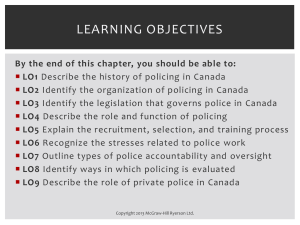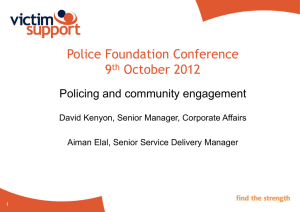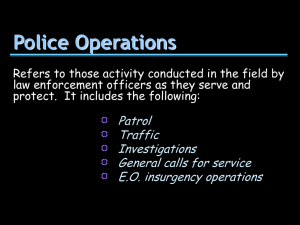Mr. Henrik Villadsen, Director, Office of the High Commissioner on
advertisement
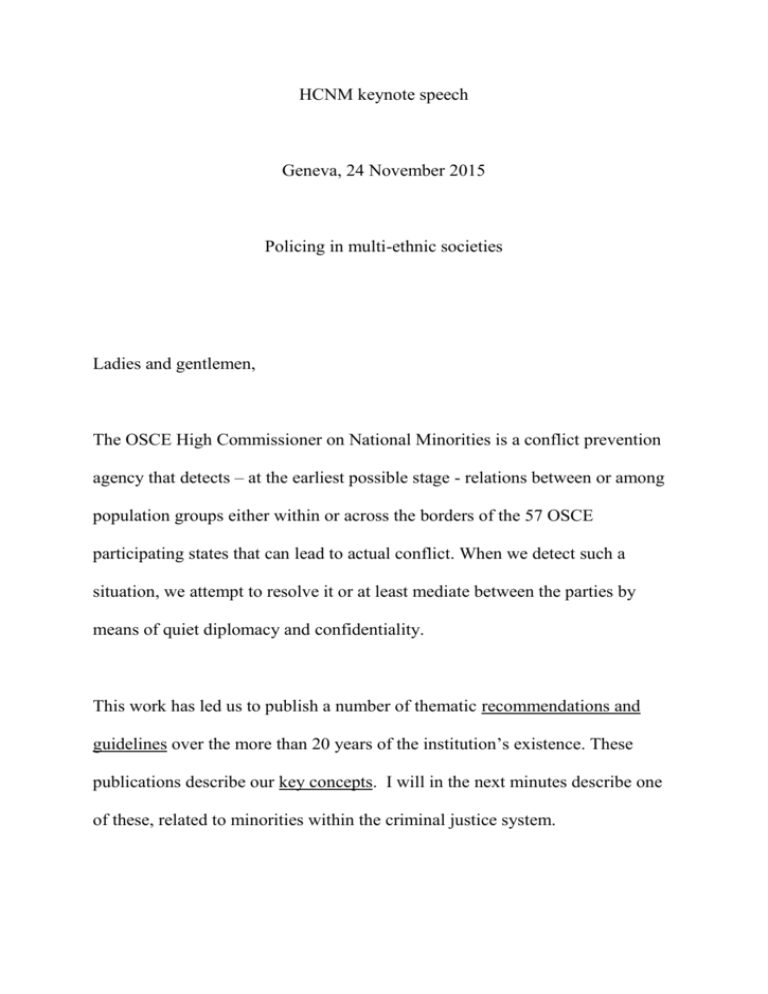
HCNM keynote speech Geneva, 24 November 2015 Policing in multi-ethnic societies Ladies and gentlemen, The OSCE High Commissioner on National Minorities is a conflict prevention agency that detects – at the earliest possible stage - relations between or among population groups either within or across the borders of the 57 OSCE participating states that can lead to actual conflict. When we detect such a situation, we attempt to resolve it or at least mediate between the parties by means of quiet diplomacy and confidentiality. This work has led us to publish a number of thematic recommendations and guidelines over the more than 20 years of the institution’s existence. These publications describe our key concepts. I will in the next minutes describe one of these, related to minorities within the criminal justice system. In 2006, the High Commissioner published the ‘Recommendations on Policing in Multi-Ethnic Societies’. The subject was not by any means new at the time. Reflections on the need to draw up rules, or at least general principles, on policing in societies where ethnically related tensions existed had been debated since at least the 1960s; for example following racial tensions and disturbances in the United States of America at that time, and later, in Europe, after a series of racially based riots surfaced in the United Kingdom at the beginning of the 1980s and later, in other countries. We have seen many recent examples too. It would lead too far to go into a description of the specific Recommendations. Suffice it to say at this stage that they cover key topics such as recruitment and representation, training and professional support, engagement with ethnic communities, operational practices and the prevention and management of conflict. However, let me elaborate on some of the reasons why the High Commissioner thought the Recommendations pertinent. When presenting the Recommendations in 2006, the High Commissioner talked about the role of police in de-escalating tensions and promoting harmonious inter-ethnic relations. Based on field work throughout the OSCE region, he had concluded that police can be both a contributor and in some instances a threat to stability in states, which are home to a plurality of ethnic groups. Let us consider the two scenarios: First, when police operate under the rule of law, are representative of the society’s demographic composition, and are responsive to the concerns and wishes of all ethnic communities, they have the potential to promote both stability in the state and the state’s legitimacy in the eyes of the multi-ethnic society. In the second scenario, we have witnessed how police can exert a negative influence on inter-ethnic relations by indiscriminate use of force, engagement in summary punishment; and ethnically motivated persecution. In such situations, the police service not only fails to serve its main purpose of preventing crime and serving the community, but also generates considerable inter-ethnic tension through heavy-handed practices and thus may even become a conflict catalyst. Considering these scenarios, it became apparent to the High Commissioner that it would be of value to have written guidance for policy makers, police, national minority communities and civil society on how to approach policing and address the issue of police-minority interaction in multiethnic societies across the OSCE region. The Recommendations were drafted with a view to promoting awareness of the handling of national minority issues in policing and assisting the Participating States with some practical guidance in developing policies and law enforcement practices – thereby promoting harmonious relations between the police and national minority communities. In the day-to-day field work of the High Commissioner, the matter of multiethnic policing is one of the leading themes - with the guiding principles being found in these Recommendations. Excellencies, ladies and gentlemen, When it comes to multi-ethnic policing, there is a multitude of factors that determines its effectiveness. In the experience of the High Commissioner, a strong feeling that you can rely on the rule of law is essential to the peaceful coexistence of national minorities. The fact that you, whoever you are, can take grievances to court and rely on being rendered a judgment that is in accordance with a law that has been passed by a parliament elected in accordance with a constitution that is compliant with international standards, is crucial. A reliable judicial process is one thing. When it comes to alleviation of tensions and conflict prevention, multi-ethnic policing has an indispensable role to play. Police and minority communities have much to gain from working closely together. Cooperation and partnership between police and minorities brings increased operational information, more intelligence, more expertise in language and cultures. Minorities will feel more secure and comfortable in their environments when they know and trust their police officers. Police operate at ‘street’ level and can thus take the opportunity of being the first responders to safeguard law and order in the society. A police service that is seen to incorporate sections of society that are otherwise excluded or marginalized will be more likely to secure the co-operation of members of all communities. A police force representative of all sections of society sends positive signals – securing legitimacy, buy-in and sustainability. In closing, it is important to remind ourselves that the issue is affecting not only the OSCE area, but they is relevant for all of us today. We have seen all too many recent examples of the needs for us to continue our work on this matter. Thank you for your attention, HV.


